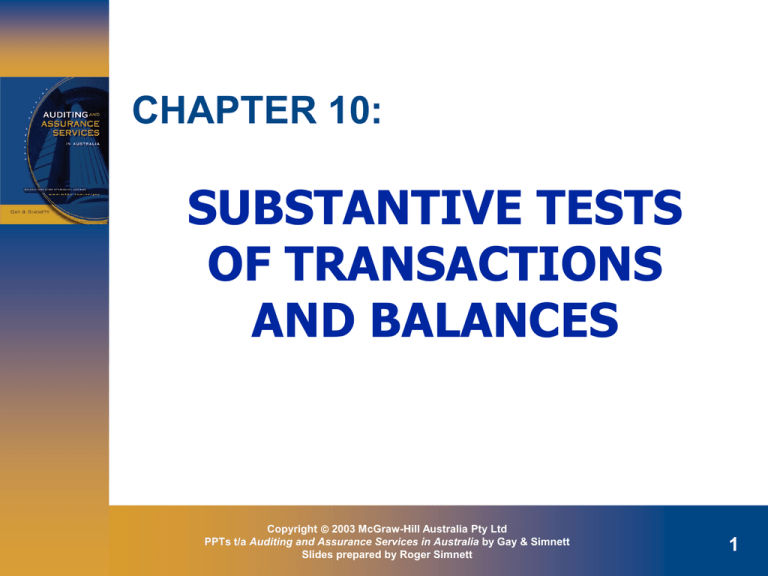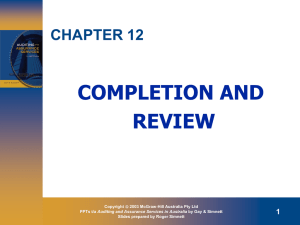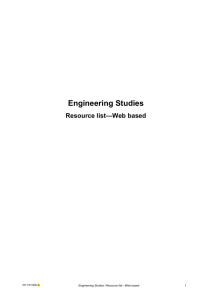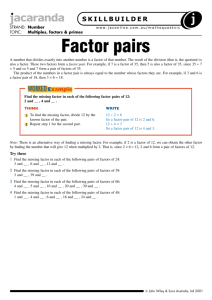Chapter 10
advertisement

CHAPTER 10: SUBSTANTIVE TESTS OF TRANSACTIONS AND BALANCES Copyright 2003 McGraw-Hill Australia Pty Ltd PPTs t/a Auditing and Assurance Services in Australia by Gay & Simnett Slides prepared by Roger Simnett 1 RELATIONSHIP BETWEEN TESTS OF CONTROLS AND SUBSTANTIVE TESTS OF TRANSACTIONS • Most controls built around transaction flows. • Tests of controls: transactions selected to test whether related controls are working. • Substantive test of transactions: transactions selected to determine whether monetary errors have occurred. Copyright 2003 McGraw-Hill Australia Pty Ltd PPTs t/a Auditing and Assurance Services in Australia by Gay & Simnett Slides prepared by Roger Simnett 2 DUAL PURPOSE TESTS • These are tests of transactions that address both control and financial misstatement issues simultaneously. • Very common in practice since both tests of controls and substantive tests of transactions involve inspection of documents. • It is efficient to perform tests on transactions selected simultaneously, e.g. select document and check evidence of authorisation (test of control) and recompute amount (substantive test of transaction). Copyright 2003 McGraw-Hill Australia Pty Ltd PPTs t/a Auditing and Assurance Services in Australia by Gay & Simnett Slides prepared by Roger Simnett 3 SUBSTANTIVE TESTS OF TRANSACTIONS AND BALANCES • Objective is to provide reasonable assurance of validity and propriety of financial report or identify monetary misstatements and thus reduce detection risk of auditor. • Substantive tests of transactions focus on the individual transactions that make up the balance. • Substantive tests of balances substantiate the ending balance of an account. Copyright 2003 McGraw-Hill Australia Pty Ltd PPTs t/a Auditing and Assurance Services in Australia by Gay & Simnett Slides prepared by Roger Simnett 4 DISTINGUISHING BETWEEN SUBSTANTIVE TESTS OF TRANSACTIONS AND SUBSTANTIVE TESTS OF BALANCES Extract from Accounts Receivable Subsidiary Ledger Customer Year-end Balance Able 5000 Baker 500 Chan 1000 • Transactions for Able Sales Receipts Sales 2000 (1000) 4000 The $5000 balance for Able could be verified by confirming this balance with customer (test of balances) or verifying to supporting documentation the three transactions comprising this balance (tests of transactions). Copyright 2003 McGraw-Hill Australia Pty Ltd PPTs t/a Auditing and Assurance Services in Australia by Gay & Simnett Slides prepared by Roger Simnett 5 FINANCIAL REPORT ASSERTIONS OF INTEREST Copyright 2003 McGraw-Hill Australia Pty Ltd PPTs t/a Auditing and Assurance Services in Australia by Gay & Simnett Slides prepared by Roger Simnett 6 EXISTENCE/ OCCURRENCE AND COMPLETENESS ASSERTIONS Note that the direction of testing determines whether existence/occurrence or completeness assertion is tested. existence (of account balance components)/ occurrence (of transactions in accounting records) Source Documents Accounting Records Completeness (of accounts balance components or transactions in accounting records) Copyright 2003 McGraw-Hill Australia Pty Ltd PPTs t/a Auditing and Assurance Services in Australia by Gay & Simnett Slides prepared by Roger Simnett 7 DETERMINANTS OF AUDIT PROCEDURES USED Will be determined by: • The assertion/audit objective to be tested • The nature of the item and available evidence Copyright 2003 McGraw-Hill Australia Pty Ltd PPTs t/a Auditing and Assurance Services in Australia by Gay & Simnett Slides prepared by Roger Simnett 8 CASH, CASH RECEIPTS AND CASH PAYMENTS — ASSERTIONS OF PRIMARY INTERESTS These are primarily: Cash • Existence; • Completeness; and possibly • Valuation (if foreign currency balances). Cash receipts/payments • Occurrence • Completeness; and possibly • Measurement (if foreign currency transactions). - since these are areas where misstatement is most likely to occur Copyright 2003 McGraw-Hill Australia Pty Ltd PPTs t/a Auditing and Assurance Services in Australia by Gay & Simnett Slides prepared by Roger Simnett 9 APPROACH IN AUDITING CASH BALANCES • Determined by assessed level of control risk in bank and cash handling procedures. • Much of this information will come from evaluations and tests of controls in the sales and cash receipts, purchases and cash payments systems. Copyright 2003 McGraw-Hill Australia Pty Ltd PPTs t/a Auditing and Assurance Services in Australia by Gay & Simnett Slides prepared by Roger Simnett 10 ASSERTIONS, OBJECTIVES AND PROCEDURES FOR CASH BALANCES Copyright 2003 McGraw-Hill Australia Pty Ltd PPTs t/a Auditing and Assurance Services in Australia by Gay & Simnett Slides prepared by Roger Simnett 11 CASH — KEY PROCEDURES These are: • Testing of client’s bank reconciliation • Obtaining confirmation of bank balances from client’s bankers Copyright 2003 McGraw-Hill Australia Pty Ltd PPTs t/a Auditing and Assurance Services in Australia by Gay & Simnett Slides prepared by Roger Simnett 12 SALES, CASH RECEIPTS, ACCOUNTS RECEIVABLE — ASSERTIONS OF INTEREST Sales/cash receipts •Occurrence •Measurement Accounts receivable •Existence •Valuation - as these are areas in which misstatement is most likely to occur Copyright 2003 McGraw-Hill Australia Pty Ltd PPTs t/a Auditing and Assurance Services in Australia by Gay & Simnett Slides prepared by Roger Simnett 13 ACCOUNTS RECEIVABLE — KEY AUDIT PROCEDURES • • • • • • Confirmation Subsequent receipts review Cut-off Analytical procedures Tests of sales transactions Review of aged trial balance Copyright 2003 McGraw-Hill Australia Pty Ltd PPTs t/a Auditing and Assurance Services in Australia by Gay & Simnett Slides prepared by Roger Simnett 14 ASSERTIONS, OBJECTIVES AND PROCEDURES FOR SALES AND ACCOUNTS RECEIVABLE Copyright 2003 McGraw-Hill Australia Pty Ltd PPTs t/a Auditing and Assurance Services in Australia by Gay & Simnett Slides prepared by Roger Simnett 15 ACCOUNTS RECEIVABLE — CONFIRMATION AND OTHER PROCEDURES Auditor might plan to obtain direct confirmation from debtors using: • Positive form — asks client to respond, whether or not they agree with information as to amount owed in request • Negative form — requests client to respond when they disagree with amount shown Auditor should also consider other procedures such as examining evidence of subsequent cash receipts, and examining sales and shipping documents. Copyright 2003 McGraw-Hill Australia Pty Ltd PPTs t/a Auditing and Assurance Services in Australia by Gay & Simnett Slides prepared by Roger Simnett 16 FORMAT OF POSITIVE ACCOUNTS RECEIVABLE CONFIRMATION REQUESTS Copyright 2003 McGraw-Hill Australia Pty Ltd PPTs t/a Auditing and Assurance Services in Australia by Gay & Simnett Slides prepared by Roger Simnett 17 CONFIRMATION PROCEDURE VERSUS SUBSEQUENT CASH RECEIPTS TESTING Subsequent cash receipts commonly viewed as superior form of evidence because achieves both key assertions. Confirmations • Existence • Valuation YES NO Subsequent cash receipts testing • Existence YES • Valuation YES Confirmations still require tests of likelihood of payment (doubtful debts provision). Copyright 2003 McGraw-Hill Australia Pty Ltd PPTs t/a Auditing and Assurance Services in Australia by Gay & Simnett Slides prepared by Roger Simnett 18 PURCHASES AND INVENTORY • Inventory consists of goods to be sold or used in the production of saleable goods. • Transactions involving inventory: increase to inventory when goods purchased and decrease to inventory when goods sold. Copyright 2003 McGraw-Hill Australia Pty Ltd PPTs t/a Auditing and Assurance Services in Australia by Gay & Simnett Slides prepared by Roger Simnett 19 RISK ASSESSMENT OF INVENTORY Inventory generally considered high risk because: • Significant to determination of income • High volume of activity • Accounting complexities • Possibility of manipulation in this area Copyright 2003 McGraw-Hill Australia Pty Ltd PPTs t/a Auditing and Assurance Services in Australia by Gay & Simnett Slides prepared by Roger Simnett 20 INVENTORY — ASSERTIONS OF INTEREST Two key assertions of inventory are generally: • Existence • Valuation Copyright 2003 McGraw-Hill Australia Pty Ltd PPTs t/a Auditing and Assurance Services in Australia by Gay & Simnett Slides prepared by Roger Simnett 21 INVENTORY — KEY PROCEDURES • • • • Observation of physical inventories Analytical procedures Cut-off Tests of pricing and summarisation Copyright 2003 McGraw-Hill Australia Pty Ltd PPTs t/a Auditing and Assurance Services in Australia by Gay & Simnett Slides prepared by Roger Simnett 22 ASSERTIONS, OBJECTIVES AND PROCEDURES FOR PURCHASES AND INVENTORY I Copyright 2003 McGraw-Hill Australia Pty Ltd PPTs t/a Auditing and Assurance Services in Australia by Gay & Simnett Slides prepared by Roger Simnett 23 ASSERTIONS, OBJECTIVES AND PROCEDURES FOR PURCHASES AND INVENTORY II Copyright 2003 McGraw-Hill Australia Pty Ltd PPTs t/a Auditing and Assurance Services in Australia by Gay & Simnett Slides prepared by Roger Simnett 24 INVENTORY — OBSERVATION OF PHYSICAL INVENTORY: STOCKTAKE • Where inventory is considered material, auditor should attend physical inventory count (stocktake), unless impractical. • When attending stocktake, auditor uses a combination of observation and inquiry and making test counts. • If inventory outside auditor’s area of expertise, should consider utilising services of expert. Copyright 2003 McGraw-Hill Australia Pty Ltd PPTs t/a Auditing and Assurance Services in Australia by Gay & Simnett Slides prepared by Roger Simnett 25 INVENTORY — TESTS OF PRICING AND SUMMARISATION OF COUNT PROCEDURES A combination of vouching, tracing and recomputation. In performing these procedures auditor’s main concerns are: • Identifying obsolete, excess and slow-moving items • That inventory is counted correctly and results of inventory count are updated correctly • That prices for goods are applied appropriately • That inventory is valued at the lower of cost and net realisable value Copyright 2003 McGraw-Hill Australia Pty Ltd PPTs t/a Auditing and Assurance Services in Australia by Gay & Simnett Slides prepared by Roger Simnett 26 ACCOUNTS PAYABLE AND PAYMENTS • Primary assertion of concern is completeness, as most likely form of misstatement is understatement. • Common audit procedures to address this assertion are confirmation, a search for unrecorded liabilities and analytical procedures performed on related expense account balances. Copyright 2003 McGraw-Hill Australia Pty Ltd PPTs t/a Auditing and Assurance Services in Australia by Gay & Simnett Slides prepared by Roger Simnett 27 ASSERTIONS, OBJECTIVES AND PROCEDURES OF ACCOUNTS PAYABLE Copyright 2003 McGraw-Hill Australia Pty Ltd PPTs t/a Auditing and Assurance Services in Australia by Gay & Simnett Slides prepared by Roger Simnett 28 NON-CURRENT ASSETS • The balances of non-current asset accounts are usually affected by a few relatively large transactions each year. • For this reason, it is usually efficient for auditor to verify account balances by performing tests on individual transactions. Copyright 2003 McGraw-Hill Australia Pty Ltd PPTs t/a Auditing and Assurance Services in Australia by Gay & Simnett Slides prepared by Roger Simnett 29 PROPERTY, PLANT AND EQUIPMENT Assertions of interest are generally: • Existence • Rights and obligations • Valuation Copyright 2003 McGraw-Hill Australia Pty Ltd PPTs t/a Auditing and Assurance Services in Australia by Gay & Simnett Slides prepared by Roger Simnett 30 PROPERTY, PLANT AND EQUIPMENT — KEY PROCEDURES • Substantiating additions and identifying retirements • Considering any revaluations • Analytically testing or recomputing related expense accounts such as depreciation Copyright 2003 McGraw-Hill Australia Pty Ltd PPTs t/a Auditing and Assurance Services in Australia by Gay & Simnett Slides prepared by Roger Simnett 31 ASSERTIONS, OBJECTIVES AND PROCEDURES FOR PROPERTY, PLANT AND EQUIPMENT Copyright 2003 McGraw-Hill Australia Pty Ltd PPTs t/a Auditing and Assurance Services in Australia by Gay & Simnett Slides prepared by Roger Simnett 32 INVESTMENTS AND INTANGIBLE ASSETS Assertions generally of interest are: • Rights and obligations • Existence • Valuation Copyright 2003 McGraw-Hill Australia Pty Ltd PPTs t/a Auditing and Assurance Services in Australia by Gay & Simnett Slides prepared by Roger Simnett 33 ASSERTIONS, OBJECTIVES AND PROCEDURES FOR INVESTMENTS Copyright 2003 McGraw-Hill Australia Pty Ltd PPTs t/a Auditing and Assurance Services in Australia by Gay & Simnett Slides prepared by Roger Simnett 34 INTANGIBLES — USE OF EXPERT • Assertions in relation to valuation and existence for intangible assets are particularly subjective given nature of intangible assets. • Auditor may consider use of experts where issues are outside auditor’s own expertise. Copyright 2003 McGraw-Hill Australia Pty Ltd PPTs t/a Auditing and Assurance Services in Australia by Gay & Simnett Slides prepared by Roger Simnett 35 INVESTMENTS AND INTANGIBLES — KEY PROCEDURES • • • • • Physical examination Confirmation Inspection of legal documents Recomputation, vouching, tracing Specialised valuation procedures Copyright 2003 McGraw-Hill Australia Pty Ltd PPTs t/a Auditing and Assurance Services in Australia by Gay & Simnett Slides prepared by Roger Simnett 36 NON-CURRENT LIABILITIES AND OWNERS’ EQUITY Key assertions completeness: Key procedures: • Confirmations • Reading minutes of meetings • Examination of contracts and agreements • Inspection of share registers Copyright 2003 McGraw-Hill Australia Pty Ltd PPTs t/a Auditing and Assurance Services in Australia by Gay & Simnett Slides prepared by Roger Simnett 37 ASSERTIONS, OBJECTIVES AND PROCEDURES FOR NON-CURRENT LIABILITIES Copyright 2003 McGraw-Hill Australia Pty Ltd PPTs t/a Auditing and Assurance Services in Australia by Gay & Simnett Slides prepared by Roger Simnett 38 STATEMENT OF FINANCIAL PERFORMANCE ACCOUNTS: ASSERTIONS OF INTEREST • • • • • Occurrence Completeness Rights and obligations Measurement Disclosure Copyright 2003 McGraw-Hill Australia Pty Ltd PPTs t/a Auditing and Assurance Services in Australia by Gay & Simnett Slides prepared by Roger Simnett 39 AUDIT PROCEDURES FOR STATEMENT OF FINANCIAL PERFORMANCE ACCOUNTS I • Substantiation indirectly by simultaneous tests of statement of financial performance accounts, e.g. sales accounts receivable; cost of goods sold inventory • Substantiation directly in conjunction with statement of financial position accounts, e.g. property, plant & equipment depreciation Copyright 2003 McGraw-Hill Australia Pty Ltd PPTs t/a Auditing and Assurance Services in Australia by Gay & Simnett Slides prepared by Roger Simnett 40 AUDIT PROCEDURES FOR STATEMENT OF FINANCIAL PERFORMANCE ACCOUNTS II • Substantiation directly by analytical procedures, e.g. relationships between amounts that are expected to follow a predictable pattern such as sales sales commission • Substantiation directly by separate direct tests of individually significant transactions or events or account balances of intrusive interest, e.g. discontinued operations Copyright 2003 McGraw-Hill Australia Pty Ltd PPTs t/a Auditing and Assurance Services in Australia by Gay & Simnett Slides prepared by Roger Simnett 41 AUDITING BY COMPUTER: TESTING CLIENTS’ FILES The major way the auditor uses the computer for substantive tests involves using audit software to read clients’ master files and/or transactions files. Major advantages: • Directs auditor’s attention to items of risk and/or materiality • Undertakes routine audit tasks efficiently Copyright 2003 McGraw-Hill Australia Pty Ltd PPTs t/a Auditing and Assurance Services in Australia by Gay & Simnett Slides prepared by Roger Simnett 42 AUDITING BY COMPUTER: FOUR MAJOR TECHNIQUES • Generalised audit software — audit interrogation software used with many clients • Specialised audit software — audit interrogation software especially written for client, task or industry • Utility programs — routines written by manufacturer for hardware, e.g. sort, merge • Systems management programs — enhanced productivity tools (e.g. data retrieval software) typically part of sophisticated operating systems environments Copyright 2003 McGraw-Hill Australia Pty Ltd PPTs t/a Auditing and Assurance Services in Australia by Gay & Simnett Slides prepared by Roger Simnett 43 FUNCTIONS OF AUDIT SOFTWARE This software can interrogate clients’ files in order to: • Select sample items • Identify records meeting specified criteria (exception reporting) • Test and make calculations • Compare data in separate fields or on separate files • Summarise data • Write reports Copyright 2003 McGraw-Hill Australia Pty Ltd PPTs t/a Auditing and Assurance Services in Australia by Gay & Simnett Slides prepared by Roger Simnett 44 EFFECT OF STRATEGIC BUSINESS RISK ON SUBSTANTIVE TESTS • Increased emphasis on tests of controls for routine transactions implies decreased emphasis for substantive tests for such transactions. • Increased emphasis on non-routine transactions implies increased emphasis on substantive tests, as would not expect sophisticated control systems around nonroutine transactions. Copyright 2003 McGraw-Hill Australia Pty Ltd PPTs t/a Auditing and Assurance Services in Australia by Gay & Simnett Slides prepared by Roger Simnett 45






